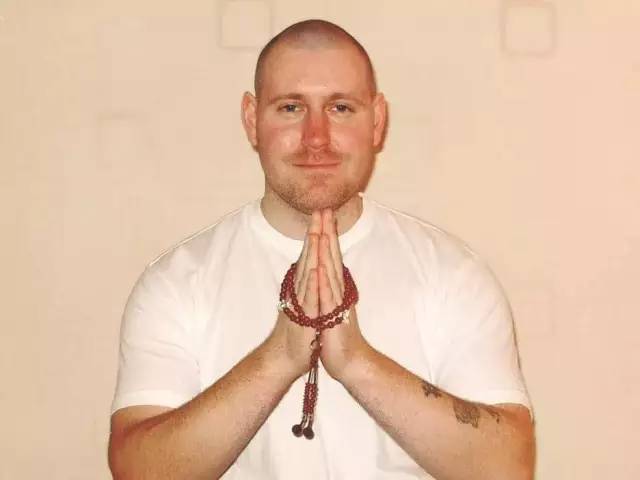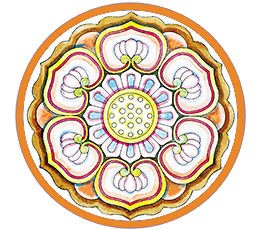Destination Shandao
By Householder Jingchun
Editor's comment by Householder Jingtu:
Conan Bristow, who hails from Camberley, England, recently took refuge with the Shandao Pure Land lineage under Master Huijing. He is now Householder Jingchun (淨純), which means Pure Integrity.
Like many of our fellow practitioners, Jingchun traveled a long and often arduous path to the pristine Pure Land school. Here is his own account:

By Householder Jingchun
Here in the United Kingdom, Buddhism is a minority faith and Pure Land Buddhism is almost unheard of. Yet, somehow, I was able to find the Pure Land way. What's more, I was able to accept it fully after a single encounter. As a child, I was spiritually aware, always wandering alone along the canal in silence while the other kids were busy playing. Seeing spirits was not uncommon for me – something my mother later told me she knew about. While I didn't understand the phenomena I witnessed, it now seems to have signaled a special purpose for this particular lifetime. As a child, I didn't know what that purpose might be; I had no framework within which to understand my desire for spiritual knowledge.
When I was 22 years old, I decided it was time to quench my thirst for truth – a thirst that, as far as I knew, I was born with. I went to a library with the intent of spending as much time as I needed to find the right book (or books) that explained the world and what lay beyond it. The spiritual aisle was very large; it seemed absurd to think I would just walk away with the answer. I stood before the aisle and gazed down the long shelves, hoping that a book would just jump out at me and save me the trouble of searching. I'll never forget this, because a book "jumping out at me" was, in a way, exactly what happened.
I felt a strange impulse to pick up a certain volume that suddenly caught my eye – a book that didn't stand out in the least. It was a small publication, about an inch thick, with a plain blue spine. Its title was "Buddhism of Wisdom and Faith: Pure Land Principles and Practice," authored by Vietnamese Master Thich Thien Tam. I had no knowledge of Buddhism, let alone Pure Land Buddhism; I just had a strong feeling that this was what I needed to read. So off I went to read it.
I couldn't believe that I was actually awake; it seemed as if I were moving through a dream. But what was happening was that I was in the midst of an awakening, the one we all have when we finally encounter truth. I read the whole book in one sitting, finishing by the early hours of the morning. I fell asleep extremely content, softly chanting "Amituofo." To my amazement, this encounter hadn’t been a dream. I awoke full of energy with the Name flooding my mind. From that moment on, I resolved to recite the name of Amitabha Buddha as my only practice and refuge.
But the biggest challenge I would face came in the guise of Buddhism itself. I met an ex-Zen monk who was giving spiritual teachings. He was a very serious person who had spent 20 years in Japan practicing meditation while facing a wall. The things he taught seemed not only unbelievable, but very far from Buddhism. I wasn't sure if I was crazy or na?ve for listening to him. But he had been a Zen monk! Surely, I could trust him, right?
What he taught was that all religions are just an overflow of consciousness, and the sufferings of the world result from humanity losing touch with darkness through its obsession with light. What he had learned from his many years of getting up to walk in the dead of night, was that we are not alone; and not so many years before, he had experienced a direct encounter with the one he called the Mother of all mothers. It was the Goddess herself: the true face of God. She is the darkness we see when we look up on a starry night, and the dirt beneath our feet is her body. No one can escape her. In her, the meaning of life is life itself – the cycle of birth, death and rebirth – and all beings have always been at her mercy, pulled inexorably towards her like celestial bodies towards a gravity well.
At the time, these things really touched me deeply. This teaching seemed to pull on the strings of my heart like nothing had before. But after two years of devotion to the Goddess, I found myself becoming very unwell and depressed, something that I still struggle with to this day. Ultimately, I knew these beliefs had to be wrong; my body was telling me that something was seriously amiss. So, I left the teaching, and immediately my health began to return. (Previously, I had always enjoyed good health, and I believe strongly that this was the result of having said the name of Amitabha for many years.)
Finally, I found my way back to the Pure Land path, and felt very happy to be returning to the teaching that had nurtured me for half my life. But there was still one last issue that needed resolving: Which is the correct interpretation of the Pure Land Dharma? After much reading and contemplating, I had a realization that has been shared by many a bygone Buddhist master: Shandao was the father of this teaching; he had been Amitabha himself, manifest in the world. As stated in his "Commentary on the Contemplation Sutra," Master Shandao's words are authorized by the Buddhas and are authoritative for all time! This statement has been deeply imprinted in my mind.
I experienced a few difficulties in transitioning out of the Japanese Pure Land schools, but this is perhaps to be expected after having invested over a decade studying the teachings of Honen, Shinran and Ippen. Despite my ongoing battle with depression, I am happy to be home, and the support I receive from the growing Shandao-lineage network in the English-speaking world is truly priceless. This is my family, one that extends across all the Dharma realms for all time. Together, we will all become Buddhas, and assist in liberating all beings everywhere under the compassionate guidance of our true parent, Amitabha the immeasurable one!
Namo Amitabha!
Characteristics
- Recitation of Amitabha’s name, relying on his Fundamental Vow (the 18th)
- Rebirth of ordinary beings in the Pure Land’s Realm of Rewards
- Rebirth assured in the present lifetime
- Non-retrogression achieved in this lifetime

The 18th Vow of Amitabha Buddha
If, when I achieve Buddhahood, sentient beings of the ten directions who sincerely and joyfully entrust themselves to me, wish to be reborn in my land and recite my name, even ten times, should fail to be born there, may I not attain perfect enlightenment. Excepted are those who commit the five gravest transgressions or slander the correct Dharma.
Guiding Principles
Faith in, and acceptance of, Amitabha’s deliverance
Single-minded recitation of Amitabha’s name
Aspiration to rebirth in Amitabha’s Pure Land
Comprehensive deliverance of all sentient beings
